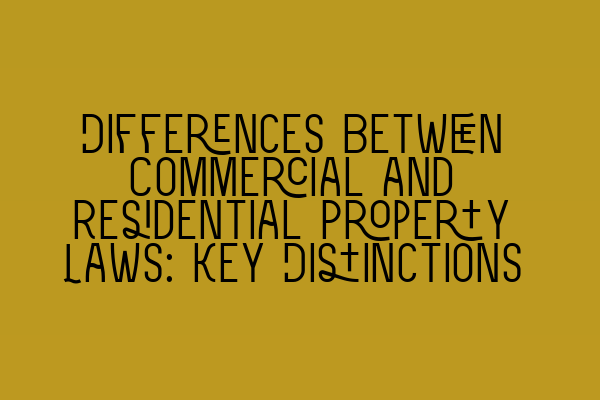Differences Between Commercial and Residential Property Laws: Key Distinctions
When it comes to property law, there are significant differences between commercial and residential properties. These differences stem from the unique nature and requirements of each type of property. Whether you’re a property investor, tenant, or landlord, understanding these distinctions is crucial to navigating the legal landscape effectively.
In this blog post, we will delve into the key differences between commercial and residential property laws, providing you with the knowledge you need to make informed decisions. So, let’s dive in!
1. Different Legal Frameworks:
Commercial property law operates under a different legal framework than residential property law. Commercial properties are subject to laws and regulations that focus on business activities, leases, and commercial agreements. On the other hand, residential properties are governed by laws designed to protect the rights and interests of individuals seeking a place to live.
It’s essential to work with a qualified commercial or residential property law solicitor who can guide you through the specific legal requirements and obligations applicable to your situation.
2. Lease Agreements:
Lease agreements in commercial and residential properties differ significantly. Commercial leases tend to be more complex, often involving longer durations and extensive negotiations between landlords and tenants. These leases may include clauses related to rent escalations, subletting, maintenance responsibilities, and lease renewals.
Residential leases, on the other hand, are typically straightforward and more standardized. They often cover the basics, such as the rental amount, duration of the lease, and rules regarding pets and noise disturbances.
Understanding the lease agreement and its terms is crucial for both landlords and tenants to avoid any potential disputes or legal issues down the line.
To dive deeper into lease agreements, you can check out our related article on “Understanding Contractual Capacity: Rights and Limitations.”
3. Property Use:
Commercial and residential properties have distinct permitted uses. Commercial properties are intended for business purposes, such as offices, retail spaces, and industrial sites. These properties may require special permits, licenses, and compliance with regulations specific to the nature of the business being conducted.
Residential properties, on the other hand, are meant for personal living. They are subject to regulations pertaining to housing standards, tenant rights, and health and safety considerations.
4. Planning Permissions:
When it comes to making changes to a property, commercial and residential properties are subject to different planning permissions. Commercial properties often require planning permissions for any significant modifications, expansions, or change of use. This is to ensure compliance with zoning and land use regulations.
Residential properties, while also subject to planning permissions, may have different criteria and restrictions. These permissions typically revolve around conserving the character of residential neighborhoods and ensuring the well-being of occupants.
5. Financial Considerations:
Commercial and residential properties come with their own set of financial considerations. Commercial properties often involve higher purchase prices, longer-term leases, and more significant financial risks. Property investors and business owners need to carefully analyze market trends, rental yields, and potential returns on investment to make informed decisions.
Residential properties, on the other hand, are typically more accessible to individual buyers and tenants. However, factors such as location, amenities, and market demand still play a significant role in determining the value and desirability of a residential property.
Whether you’re dealing with commercial or residential property, understanding the financial implications and seeking professional advice can help mitigate risks and maximize returns.
To enhance your understanding of property law and its related concepts, you may want to explore our interactive SQE mock tests for contract law. These tests provide valuable insights and allow you to test your knowledge in a simulated exam environment.
In conclusion, commercial and residential property laws have crucial distinctions that impact the rights and obligations of landlords, tenants, and property investors. By familiarizing yourself with these differences and seeking professional advice from a property law solicitor, you can ensure compliance, protect your interests, and make informed decisions in the property market.
For more in-depth insights into property law, join our SQE property law webinars, where our experts provide valuable guidance and share their insights on various property-related topics.
And if you’re interested in contract law reforms and recent changes in the field, our article on “Contract Law Reforms: An Analysis of Recent Changes” provides a comprehensive analysis to keep you up to date.
Remember, whether you’re involved in commercial or residential property transactions, working with an experienced property law solicitor is essential for navigating the legal intricacies and ensuring the best outcome for your situation.
Disclaimer: The information provided in this blog post is for general informational purposes only and does not constitute legal advice. For personalized advice regarding your specific situation, consult with a qualified property law solicitor.
References:
– Understanding Contractual Capacity: Rights and Limitations: https://contract-law-sqe.co.uk/understanding-contractual-capacity-rights-and-limitations/
– Interactive SQE Mock Tests for Contract Law: Test Your Knowledge: https://contract-law-sqe.co.uk/interactive-sqe-mock-tests-for-contract-law-test-your-knowledge/
– Join Our SQE Contract Law Webinars: Expert Insights and Guidance: https://contract-law-sqe.co.uk/join-our-sqe-contract-law-webinars-expert-insights-and-guidance/
– Contract Law Reforms: An Analysis of Recent Changes: https://contract-law-sqe.co.uk/contract-law-reforms-an-analysis-of-recent-changes/
– Parties in a Contract: Rights and Responsibilities: https://contract-law-sqe.co.uk/parties-in-a-contract-rights-and-responsibilities/
